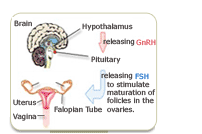34 MENOPAUSE SYMPTOMS |
HEALTH CENTER |
|
| |
|
|
|
|
|
|
|
|
|
Many women are alarmed to find that mood swings become far more frequent and more intense during menopause. Emotional turbulence can be destabilizing not only for the menopausal woman, but also for her family, friends and coworkers. Fortunately, mood swings typically don't indicate a psychological disorder, but are a normal part of the menopause transition that can easily be treated. Keep reading to learn more. |
|
|
|
Menopausal mood swings are similar to the emotional fluctuations experienced during PMS (premenstrual syndrome): rapid, inexplicable changes in mood and more intense emotional reactions. A mediocre film may suddenly seem hilariously funny, while a coworker's annoying habits become infuriating. Intense irritability, sadness, and sudden bouts of tears become more common. |
|
The mood swings experienced during menopause are typically distinct from more severe psychological disorders, like clinical depression or bipolar disorder. Mood swings are triggered by hormonal changes during menopause and age-related stress, while bipolar disorder (alternating episodes of severe depression and intense mania) is caused by brain chemical imbalances and requires medical supervision. Keep reading to learn how to distinguish between the symptoms of the two.
|
|
|
- Sudden fluctuations in emotion
- Short-lived bouts of tears
- Increased irritability
- Temporary feelings of sadness
- More intense reactions to normal stimuli
|
 |
|
|
- Periods of intense, oppressive sadness lasting for longer than 2 weeks
- Withdrawal from family, friends
- Loss of interest in normal activities
- Sleep/eating disorders
- Periods of intense mania, restlessness, hyperactivity
|
|
Mood swings can be extremely frustrating, but the good news is that mood swings are to a large extent treatable. Keep reading to learn about the causes of menopausal mood swings in order to make an informed decision about treatment.  |
|
| |
|

|
|
PMS heralds mood
deterioration during HRT |
|
A recent study found that increased progestin and estrogen hormones used in hormone replacement therapy (HRT) cause significant mood swings in women, symptoms which are more severe in women who have a history of PMS (premenstrual syndrome). |
|
|
| |
| |
| |
|
|
|
Mood swings may seem inevitable, but there are different treatment options that can bring relief. Keep reading the section below to learn about the most effective treatments for menopause-related mood swings, including lifestyle changes, alternative treatments, and medical procedures.
|
|
|
|
|
|
Treatment for Mood Swings
with
MacaActive Supplements |
|
As you have already read, mood swings are mainly caused by declining estrogen levels, which is a natural part of aging. Therefore, if you want relief from this undesirable symptom, you must restore estrogen hormone levels.
Today there are three effective ways to normalize hormonal levels: lifestyle changes, alternative medicine and drugs & surgery.
|
|
|
 |
Lifestyle Changes: This level of treatment involves no risk, but may be the hardest way to go because you'll have to restrict yourself from many things. That's why most people consider the next level of treatment, alternative medicine, which has proven to be excellent for treating mood swings in a safe and natural way.
|
|
|
 |
Alternative medicine: There are two types of herbal supplements for treating mood swings: Those containing phytoestrogenic herbs, and those containing non-estrogenic herbs. Phytoestrogenic herbs (like Black Cohosh) are filled with phytoestrogens, which are similar to estrogens. They can increase low estrogen levels by replacing some of the missing estrogen hormones. This isn't the best solution, however, because your body will become less responsive to producing estrogen on its own, causing a further decrease in body-own hormone levels. Unlike phytoestrogenic herbs, non-estrogenic herbs don't contain estrogen, but nourish hormonal glands to work more efficiently. This ultimately results in balancing not only estrogen, but other necessary hormones, as well. Non-estrogenic herbs are thus one of the best and safest ways to treat mood swings naturally.
An excellent example of a safe and effective non-estrogenic herb for hormonal imbalance is herbal MacaActive. What makes MacaActive so special is its ability to balance hormonal levels in women by nourishing the hormonal glands. It thus alleviates most disorders related to hormonal imbalance, including mood swings.  to read more about MacaActive.
|
|
|
 |
Drugs and Surgery: This level of treatment has the highest risk and often the highest costs. The most common drug therapy for treating mood swings in the US is hormone replacement therapy (HRT). There's no doubt that this is the quickest and strongest way to combat hormonal imbalance. Unfortunately, it entails serious side effects and increases the risk of different types of cancer in women. If you still want to consider this approach, see your doctor to become better informed about what this treatment option involves.
|
|
|
A safe way for balancing hormones:
Non-estrogenic herbs are the most effective solution for treating hormonal imbalance and its related symptom, mood swings.
MacaActive is an excellent non-estrogenic herb. It's simple: rather than putting hormones from the outside into your body artificially, MacaActive stimulates your hormone glands into producing the necessary hormones naturally. This is what makes MacaActive supplements so unique.  to read all about MacaActive. |
 |
|
|
 |
|
|
|







